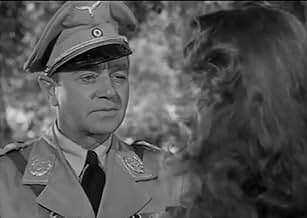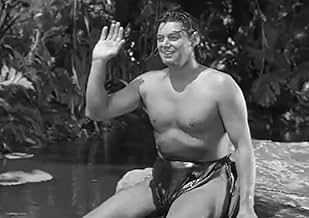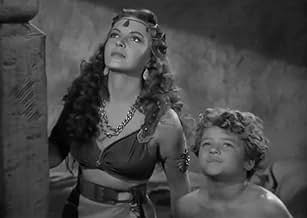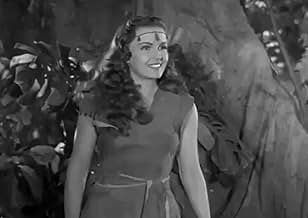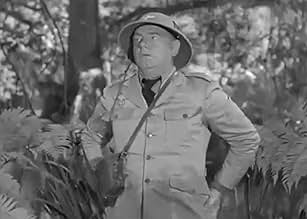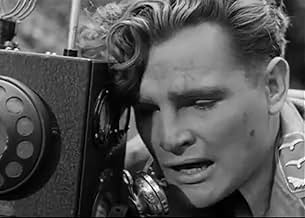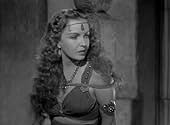Un gruppo di paracadutisti nazisti sbarca sulla città nascosta di Palandria per sfruttarne la ricchezza e iniziano a prendere ostaggi. Riusciranno Tarzan, il potente re della giungla, e i su... Leggi tuttoUn gruppo di paracadutisti nazisti sbarca sulla città nascosta di Palandria per sfruttarne la ricchezza e iniziano a prendere ostaggi. Riusciranno Tarzan, il potente re della giungla, e i suoi fidati compagni, Cheeta e Buli, a salvarli?Un gruppo di paracadutisti nazisti sbarca sulla città nascosta di Palandria per sfruttarne la ricchezza e iniziano a prendere ostaggi. Riusciranno Tarzan, il potente re della giungla, e i suoi fidati compagni, Cheeta e Buli, a salvarli?
- Regia
- Sceneggiatura
- Star
- German Officer in Berlin
- (non citato nei titoli originali)
- Heinz
- (non citato nei titoli originali)
- Achmet
- (non citato nei titoli originali)
- Nazi Pilot
- (non citato nei titoli originali)
- Pallandria Man
- (non citato nei titoli originali)
- Grüber
- (non citato nei titoli originali)
- General Hoffman in Berlin
- (non citato nei titoli originali)
- Nazi Guard
- (non citato nei titoli originali)
Recensioni in evidenza
The story opens with Boy (Johnny Sheffield) leaving the tree-house and riding his elephant, accompanied by his chimpanzee pet, Cheetah, to meet with Tarzan (Johnny Weissmuller), who had earlier gone to the seacoast to obtain a letter written to him by Jane, who's away visiting with relatives in war-torn England. Along the way, the ever curious Boy gets himself in trouble when wanting to take a closer look at the lost city of Palandria located at the bottom of a cliff. Falling off the crevasse, landing on top of a semi loose branch, Zandra (Frances Gifford), the white princess of that lost civilization, comes to his rescue. In helping Boy, the two find themselves trapped on the narrow ledge, that is, until Tarzan arrives in time to save the day. As Tarzan, Boy and Zandra part company, Zandra returns to her civilization where her people welcome some strangers, Nazis who have parachuted down from their airplane. In time, the welcomed guests "repay" their friendly hospitality by turning the peaceful community into slaves while taking possession of their wealth in tin and oil. In the meantime, Lieutenant Scheldon Schmidt (Rex Williams), who had also parachuted from an airplane, injures his leg while holding onto his shortwave radio. Tarzan rescues the German youth from a near drowning. With the help of Boy, they take the injured party to their tree-house for rest and recovery. Because Cheetah has taken and hidden the coil needed to make radio communication to his homeland, Schmidt stirs trouble by chasing after and shooting Cheeta. Sensing danger, Boy's elephant comes to Cheetah's rescue by forcing both Nazi and heavy boulder over a cliff, killing the abductor. Because of the Nazi invasion in her city, Zandra comes to Tarzan for help. Tarzan succeeds in doing away with the Germans by leading them to the river where they are attacked by cannibal fish. While Tarzan feels the Nazi invasion in Palandria does not really concern him, Zandra feels it does, knowing that as long as the Nazis are around, no one is safe. Only after the Nazis invade Tarzan's domain, with its leader, Von Reichart (Stanley Ridges) abducting Boy and holding him prisoner in Nazi headquarters for not revealing the whereabouts of the coil for the radio does Tarzan begin to realize and cry out, "Now, Tarzan make war!!!" (It's been said by Bob Dorian, former host of American Movie Classics, that this scene alone found audiences in movie theaters cheering and applauding).
An average Tarzan adventure by today's standards with a timely message of how an invasion of a territory and war amongst a peaceful people does concern everybody. As with the Tarzan character, who lives a secluded life in his little habitat, with his philosophy, "Nazi leave me alone, Tarzan leave them alone," all that changes when Nazis take over his territory and become a danger to Boy. Against all odds, such as being held prisoner himself, tied up against the pole to await execution by firing squad at dawn does Tarzan manage to become a one man revolution. Tarzan, who fights to survive while the enemy, the Nazis in this case, survive to fight, brings forth his own war for that, as quoted by Tarzan, "In jungle, the strong always win."
The supporting players include Sig Rumann as the Head Nazi; Philip Van Zandt as Captain Bausch; Pedro De Cordoba as Patriarch; and Stanley Brown as Archmet. Frances Gifford, who makes her sole venture in the series, gets some screen time in a stretched out segment filling in for Jane by swimming with Tarzan, and preparing dinner for him and Boy.
As with the entire Tarzan movie series that has spanned decades, TARZAN TRIUMPHS, at 76 minutes, aired frequently on commercial television for many years before shifting over to the American Movie Classics cable channel (1997-2000) and Turner Classic Movies (TCM premiere: May 14, 2011). Unlike the MGM entries, the six features made at RKO Radio starring Weissmuller from 1943 to 1948, were never distributed onto video cassette but later onto DVD around 2008. Next chapter: TARZAN'S DESERT MYSTERY, where Tarzan and Boy (minus Jane) encounter more Nazis once more but with a few added surprises along the way. (**)
Interestingly, "Tarzan the Untamed" leads to a climax involving a strange European civilization hidden in a deep valley, rather like the one featured in "Tarzan Triumphs." Although the script for "Tarzan Triumphs" is credited as an original story, it seems clearly inspired by "Tarzan the Untamed."
A lot of people seem to have a bias against the RKO Tarzan films, but in truth, it was MGM which gradually morphed the Tarzan franchise from A-picture status to B-picture status, gradually reducing the budget and running time of each picture. And MGM had a bad habit of recycling footage from previous entries in the series...how many times did audiences have to watch the trapeze-vine and the crocodile-wrestling scenes?
In fact, it was probably a good thing that the franchise migrated from MGM to RKO, because RKO made some of the best B-pictures of all time, including many classy ones like the Val Lewton horror series, whereas MGM treated their B-pictures like red-headed step-children. Here we get a brand-new plot and a good script, and we get to see Tarzan fighting a bunch of WW2 Jerries. Thanks to Indiana Jones, it turns out that Nazis are timeless villains, which likely would have surprised the creators of this film, who clearly were content to make a fun propaganda piece.
Above all other considerations, we get Weissmuller and his distinctive portrayal of Tarzan. Maureen O'Sullivan, who was wonderful in her own right and who brought out the best in Weissmuller, is absent here, but we find that Our Hero delivers a good-to-excellent performance throughout, being strangely moving in the scene where Boy reads Jane's letter and his righteous fury is very effective when he utters this famous line: 'Now...Tarzan make war!'
Frances Gifford was an excellent choice as the beautiful and brave princess Zandra, who besides being eye-candy for the adolescents and adults in the audience, has very good chemistry with Weissmuller. Perhaps the chemistry is a little too good...Zandra attempts to persuade Tarzan to help by engaging in some enjoyable flirtation...if Jane had seen the two swimming and sunbathing together, if she had seen Zandra leaning her head on Tarzan's bare chest in a moment of despair, she might not have come back from London in 'Tarzan and the Amazons.'
The MGM Tarzan films were marred by blatantly racist depictions of African tribes. For some reason, the RKO Tarzans seem to have few dark- skinned African tribes, but numerous groups of hidden pale-skinned cities. I don't know why RKO's fictional Africa was populated this way, but I will speculate that it may be due to the fact that in WW2, the US govt. made certain efforts to squelch racism in the media, due to the fact that excessive racial oppression was deemed bad for the war effort. DC Comics, who published the Justice Society of America, did some anti-racism comics during the war, at the behest of the War Department.
Whatever the reason, we are spared the usual bad African stereotypes, but at the same time, it is odd to think of an Africa inhabited mostly by pale-skinned people.
The action and violence in this film are, by the standards of B-movies and Weissmuller Tarzans, very good and satisfying, particularly the sequence where Tarzan tracks and taunts the lead Nazi. Sig Ruman, who played Sgt. Shultz in my favorite Christmas movie, 'Stalag 17,' plays a comedy-relief Nazi here, to good effect.
The Nazis go to Africa seeking oil and strategic mineral wealth, and they use military domination to secure their holdings...the Jerries' troops were called 'Africakorps.' Today, the USA and other military powers are still active in many African nations, perpetrating intrigue, fomenting violence, allying themselves with unsavory characters and regimes, so as to secure petroleum and strategic minerals, such as coltan, which is vital for cell phones and personal electronics. The USA has 'Africom.' Now more than ever, the world needs a Tarzan. Barring that possibility, at least we can watch and contemplate this fun adventure.
Lo sapevi?
- QuizM-G-M was unwilling to let RKO use their recording of Johnny Weissmuller's signature "Tarzan yell," which had accompanied the character as he swung through the jungle clinging to vines in every Metro Tarzan film. The one heard here is a much shorter, less robust rendition, and clearly not the original version.
- BlooperWhen Tarzan is fighting the Nazis, he rips the magazine off a machine gun and tosses it to the ground. A moment later, one of the Nazis starts climbing to the top of the building to use the gun, and you can see the magazine still there. Yet when the Nazi arrives at the gun, the magazine is missing again.
- Citazioni
Tarzan: Zandra! Why Zandra leave now?
Zandra: My place is in Pallandria!
Tarzan: Zandra stay here!
Zandra: No Tarzan.
Tarzan: Tarzan say yes!
Zandra: I must return to help my people!
Tarzan: Come back till Nazis go away!
Zandra: They will never go away! I must go!
Tarzan: Zandra very stubborn! Tarzan know best. Come, please.
- ConnessioniEdited into Tarzan contro i mostri (1943)
I più visti
- How long is Tarzan Triumphs?Powered by Alexa
Dettagli
Botteghino
- Lordo Stati Uniti e Canada
- 3.270.000 USD
- Tempo di esecuzione
- 1h 16min(76 min)
- Colore
- Proporzioni
- 1.37 : 1

